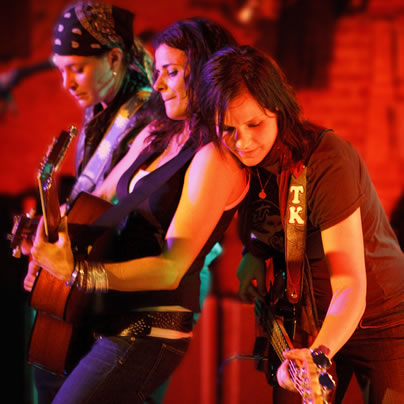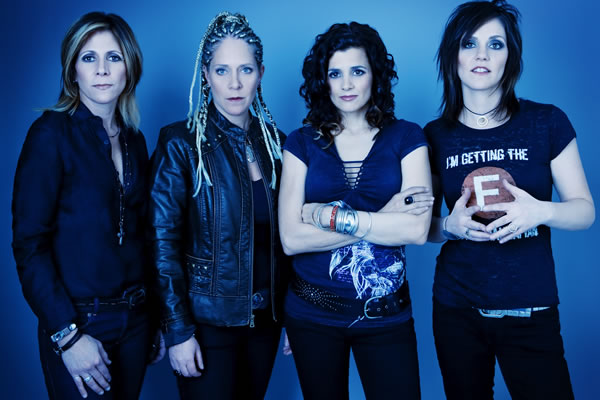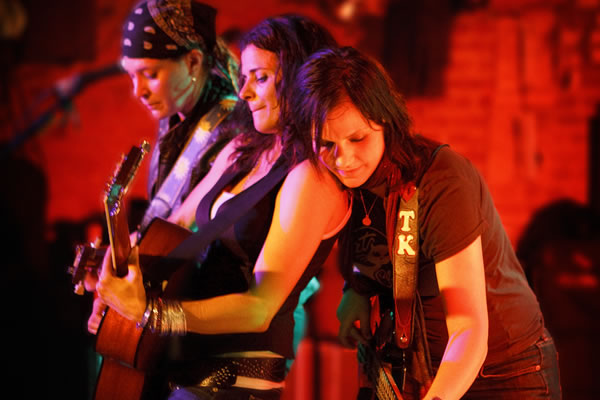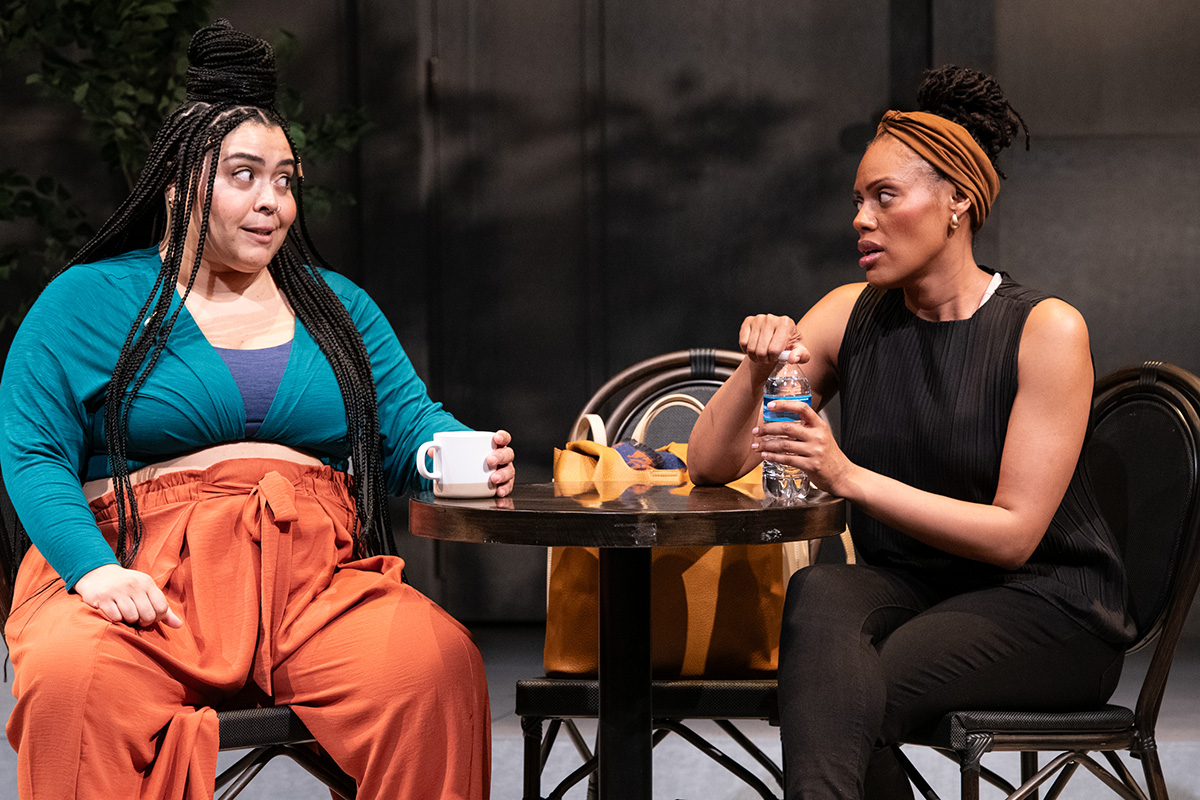Arts & Entertainment
On the rise
All-girl lesbian rock band set to play Jammin’ Java this weekend


Antigone Rising is, from left, Dena Tauriello, Cathy Henderson, Nini Camps and Kristen Ellis-Henderson. (Photo by Anthony St. James)
Antigone Rising with Mama’s Black Sheep
Jammin’ Java
Saturday
Doors at 5 p.m.; show at 6
Tickets: $15 ($18 at the door)
227 Maple Ave. E
Vienna, Va.
Jamminjava.com
Antigonerising.com
It’s been a good year for Antigone Rising.
The all-girl country/rock band got strong video play on CMT with current single “That Was the Whiskey” and founding member Kristen Ellis-Henderson made the April 8 cover of Time magazine for the lesbian version of its controversial “Gay Marriage Already Won” issue with her wife, Sarah Kate Ellis-Henderson.
The band — all lesbians in the current lineup — plays Vienna’s Jammin’ Java Saturday night. We spoke with Ellis-Henderson by phone two weeks ago from her home in Sea Cliff, N.Y. Her comments have been slightly edited for length.
WASHINGTON BLADE: The band has such great vocal harmony. How integral is working out the harmony parts when constructing the song as a whole?
KRISTEN ELLIS-HENDERSON: It depends. We’ve been doing it so long now that a lot of times we just kind of fall into a certain role. But very often when we’re writing melodically, we’re also thinking about the harmonies too. We often say if we have to work too hard or think too hard about it, we must be going about it the wrong way. Often we’ll just go with what flows the most naturally. This has been a philosophy that has held true in other areas of our career as well. Certain songs will just click faster and every once in awhile we have to really push for something but often they’re the ones that aren’t really well received. We’ve just found that to be a kind of rule almost.
BLADE: Do you all write?
ELLIS-HENDERSON: (Lead singer) Nini (Camps) and I are the primary songwriters but we’re a band so we all have a part in it. Again, we’ve been together so long now, I almost know instinctually what Cathy (Henderson, Ellis-Henderson’s sister) and (drummer) Dena (Tauriello) will bring to it. But yes, technically Nini and I hole up in a room, then we bring it to the band and the band takes it to the next level.
BLADE: By now we’ve seen out singers be out in every way possible from coming out late in their careers, being out right from the start and every step in between. How calculated was the handling of that early on in the band?
ELLIS-HENDERSON: In the earlier part of our career, we were often methodical about trying to keep it on the inside. I never was comfortable with trying to keep it quiet because we’d always played gay bars and anybody who paid attention knew it. But there were some in the band at the time who felt in the ‘90s, that it would be pigeonholing ourselves to be more out. We had some straight people in the band at the time and some members who felt pretty strong about that. I never really felt that way and I always knew our strongest support came from the lesbian and gay community. Then over time, the band has shifted members. I started a family and have a wife and kids so I can’t really live my life in the closet. We say now the music and the band are pretty much an open book. We’re here, we’re gay and we’re proud and we feel that goes hand in hand with being in a band. I know there are some artists who feel differently and that’s fine. Everybody has their own approach. Some feel it’s not their place to try to change hearts and minds but I feel we have a bigger role and that’s something we can all contribute to.
BLADE: So it just kind of worked out that all the current members are lesbians?
ELLIS-HENDERSON: Nini has been with us since 2008 but Cathy and Dena and I have been together almost 20 years. Cathy and I started the band and maybe five years after that, Dena joined us and has been with us about 15 years. Nini and I were always writing together and she toured with us some and was like an honorary member in some ways for a long time, back when we did some shows with the Bangles. But she’s been officially with us about five years.
BLADE: “That Was the Whiskey” got some strong attention this year. Was that from an album or is it slated to be on one?
ELLIS-HENDERSON: It wasn’t and here’s the thing — and we are literally still in talks about this — but we are discussing whether we want to ever release another album. We’re seriously thinking about just offering a different download every other month and kind of making that our business model. … Even with big acts like Miley Cyrus and Katy Perry who are on these huge major labels, they have these huge hits that everybody downloads and it’s like nobody even cares anymore about the rest of the album. I mean that’s what the numbers are really showing. The whole industry is in disarray so we’re thinking of changing our business model and thinking this could be something we could be really successful at — just going one song at a time and make each one an event.
BLADE: But isn’t there something creatively satisfying with a longer-form artistic statement, both for yourselves and for the hardcore fans who do want something to sink their teeth into?
ELLIS-HENDERSON: I understand what you’re saying, but it’s just an art form that’s practically non-existent anymore. I can feel that way as an artist but I have to be realistic too and that’s just the way music is being consumed. I am one of those people who likes to ooh and aah over a tangible product so we’re thinking about the end of the year, maybe putting out an EP of that year’s songs. We’ve always had a slightly different business model, though. We record our shows and sell them and it’s just different from the Katy Perrys of the world and these huge artists. Yes, I could sit here and lament the death of the record album and CD and I do, but at the same time — I mean even with me, there are only a handful of artists, Shawn Colvin for one, who I want to hear start to finish. I don’t really care about Katy Perry’s full album. I want her singles though. … I think this could be a more interesting way to go than disappearing off the face of the earth for two years.
BLADE: How rigid have you found the lines to be in various markets? It strikes me as pretty cool that CMT would play your video.
ELLIS-HENDERSON: Yeah, I find it kind of shocking. Nashville as a rule is still pretty closeted. There are certain artists there whom I know are gay who will intentionally not join us for dinner out there or they just never seem to be able to make it to our show when we’re in town. There are others who support us wholeheartedly but Nashville is definitely about 25 years behind New York and L.A. and even D.C., you know the more forward markets. Even Atlanta is more progressive than Nashville. I kinda love the contradiction. Here’s this really rowdy band and a song about whiskey but in the video, she leaves with a guy and a girl. I love pushing that boundary. I think it’s changing too. We have people like Kacey Musgraves singing her song about “make lots of noise/kiss lots of boys/or kiss lots of girls if that’s something you’re into.” GLAAD Tweeted about it. It literally gave me chills to see her on the CMAs singing that to the whole country community. I think the fact that she’s not gay actually helps. It’s one inch closer.
BLADE: Is your show at Jammin’ Java part of a larger tour or do you just go out here and there?
ELLIS-HENDERSON: We’re kind of on perpetual tour. It goes in spurts. We’re raising families, which is really contradictory to the rock and roll lifestyle, so we’re always going out in little fits and spurts. We’ll do some holiday-themed shows since it’s December.
BLADE: Is this show part of that?
ELLIS-HENDERSON: Yeah. We have a new Christmas single and we’ll definitely two or three other Christmas songs too. We’ll give the show a little Christmas twist.
BLADE: How long is your show on average?
ELLIS-HENDERSON: We do about 80 minutes and play maybe 18-20 songs. We’re a live band so we’re always a little spontaneous. It’s always a slightly different show.
BLADE: Does Cathy braid her own hair?
ELLIS-HENDERSON: She doesn’t. She’s got this woman, Nancy, who’s been doing it forever. If we’re going out, she needs like eight hours the day before to get her hair braided. In a pinch or like on really long tours, I’ve done it and oh my God, it is a process. I’m always thinking, “Just get dreads already.” If I have to do it, she just gets six or seven big rows. That’s all I have the brainpower to be able to handle.
BLADE: If you had to guess, what percentage of the people who come to your shows are LGBT?
ELLIS-HENDERSON: It’s so hard to say. I kind of always assume they’re gay. I’m like, “Oh my God, you look gay to me.” I would guess about 60 percent are LGBT. In some ways it seems more mixed than ever. But we have a large gay following and I love it. We’ve always had that support. Even when we were just a tiny little indie band we’d be out in these random markets, these little college towns, and we’d have clubs willing to book us on a Tuesday night because there was never a room that there weren’t 10 or 15 young lesbians who traveled to see us. That’s the great thing about the gay community, we support each other. Then we’d have people say, “Wow, you got a little crowd even on a weeknight, we’ll have you back” and the next time those 10 or 15 would bring a few more so there’d be 15 or 20 more and we’d have 50. We’re so grateful for that support.
BLADE: But do you ever fear that that ends up becoming the band’s whole shtick, or at least that some will have the perception that that’s all you’re about?
ELLIS-HENDERSON: Not for me. I find it a blessing and an honor to talk about it and maybe be a role model or an advocate. I love talking about activism, that’s why I blog. It’s a passion.

Antigone Rising live. (Courtesy photo)
Theater
Round House explores serious issues related to privilege
‘A Jumping-Off Point’ is absorbing, timely, and funny

‘A Jumping-Off Point’
Through May 5
Round House Theatre
4545 East-West Highway, Bethesda, Md.
$46-$83
Roundhousetheatre.org
In Inda Craig-Galván’s new play “A Jumping-Off Point,” protagonist Leslie Wallace, a rising Black dramatist, believes strongly in writing about what you know. Clearly, Craig-Galván, a real-life successful Black playwright and television writer, adheres to the same maxim. Whether further details from the play are drawn from her life, is up for speculation.
Absorbing, timely, and often funny, the current Round House Theatre offering explores some serious issues surrounding privilege and who gets to write about what. Nimbly staged and acted by a pitch perfect cast, the play moves swiftly across what feels like familiar territory without being the least bit predictable.
After a tense wait, Leslie (Nikkole Salter) learns she’s been hired to be showrunner and head writer for a new HBO MAX prestige series. What ought to be a heady time for the ambitious young woman quickly goes sour when a white man bearing accusations shows up at her door.
The uninvited visitor is Andrew (Danny Gavigan), a fellow student from Leslie’s graduate playwriting program. The pair were never friends. In fact, he pressed all of her buttons without even trying. She views him as a lazy, advantaged guy destined to fail up, and finds his choosing to dramatize the African American Mississippi Delta experience especially annoying.
Since grad school, Leslie has had a play successfully produced in New York and now she’s on the cusp of making it big in Los Angeles while Andrew is bagging groceries at Ralph’s. (In fact, we’ll discover that he’s a held a series of wide-ranging temporary jobs, picking up a lot of information from each, a habit that will serve him later on, but I digress.)
Their conversation is awkward as Andrew’s demeanor shifts back and forth from stiltedly polite to borderline threatening. Eventually, he makes his point: Andrew claims that Leslie’s current success is entirely built on her having plagiarized his script.
This increasingly uncomfortable set-to is interrupted by Leslie’s wisecracking best friend and roommate Miriam who has a knack for making things worse before making them better. Deliciously played by Cristina Pitter (whose program bio describes them as “a queer multi-spirit Afro-indigenous artist, abolitionist, and alchemist”), Miriam is the perfect third character in Craig-Galván’s deftly balanced three-hander.
Cast members’ performances are layered. Salter’s Leslie is all charm, practicality, and controlled ambition, and Gavigan’s Andrew is an organic amalgam of vulnerable, goofy, and menacing. He’s terrific.
The 90-minute dramedy isn’t without some improbable narrative turns, but fortunately they lead to some interesting places where provoking questions are representation, entitlement, what constitutes plagiarism, etc. It’s all discussion-worthy topics, here pleasingly tempered with humor.
New York-based director Jade King Carroll skillfully helms the production. Scenes transition smoothly in large part due to a top-notch design team. Scenic designer Meghan Raham’s revolving set seamlessly goes from Leslie’s attractive apartment to smart cafes to an HBO writers’ room with the requisite long table and essential white board. Adding to the graceful storytelling are sound and lighting design by Michael Keck and Amith Chandrashaker, respectively.
The passage of time and circumstances are perceptively reflected in costume designer Moyenda Kulemeka’s sartorial choices: heels rise higher, baseball caps are doffed and jackets donned.
“A Jumping-Off Point” is the centerpiece of the third National Capital New Play Festival, an annual event celebrating new work by some of the country’s leading playwrights and newer voices.
Nightlife
Ed Bailey brings Secret Garden to Project GLOW festival
An LGBTQ-inclusive dance space at RFK this weekend

When does a garden GLOW? When it’s run by famed local gay DJ Ed Bailey.
This weekend, music festival Project GLOW at RFK Festival Grounds will feature Bailey’s brainchild the Secret Garden, a unique space just for the LGBTQ community that he launched in 2023.
While Project GLOW, running April 27-28, is a stage for massive electronic DJ sets in a large outdoor space, Secret Garden is more intimate, though no less adrenaline-forward. He’s bringing the nightclub to the festival. The garden is a dance area that complements the larger stages, but also stands on its own as a draw for festival-goers. Its focus is on DJs that have a presence and following in the LGBTQ audience world.
“The Secret Garden is a showcase for what LGBTQ nightlife, and nightclubs in general, are all about,” he says. “True club DJs playing club music for people that want to dance in a fun environment that is high energy and low stress. It’s the cool party inside the bigger party.”
Project GLOW launched in 2022. Bailey connected with the operators after the first event, and they discussed Bailey curating his own space for 2023. “They were very clear that they wanted me to lean into the vibrant LGBTQ nightlife of D.C. and allow that community to be very visibly a part of this area.”
Last year, club icon Kevin Aviance headlined the Secret Garden. The GLOW festival organizers loved the its energy from last year, and so asked Bailey to bring it back again, with an entire year to plan.
This year, Bailey says, he is “bringing in more D.C. nightlife legends.” Among those are DJ Sedrick, “a DJ and entertainer legend. He was a pivotal part of Tracks nightclub and is such a dynamic force of entertainment,” says Bailey. “I am excited for a whole new audience to be able to experience his very special brand of DJing!”
Also, this year brings in Illustrious Blacks, a worldwide DJ duo with roots in D.C.; and “house music legends” DJs Derrick Carter and DJ Spen.
Bailey is focusing on D.C.’s local talent, with a lineup including Diyanna Monet, Strikestone!, Dvonne, Baronhawk Poitier, THABLACKGOD, Get Face, Franxx, Baby Weight, and Flower Factory DJs KS, Joann Fabrixx, and PWRPUFF.
Secret Garden also brings in performers who meld music with dance, theater, and audience interactions for a multi-sensory experience.
Bailey is an owner of Trade and Number Nine, and was previously an owner of Town Danceboutique. Over the last 35 years, Bailey owned and operated more than 10 bars and clubs in D.C. He has an impressive resume, too. Since starting in 1987, he’s DJ’d across the world for parties and nightclubs large and intimate. He says that he opened “in concert for Kylie Minogue, DJed with Junior Vasquez, played giant 10,000-person events, and small underground parties.” He’s also held residencies at clubs in Atlanta, Miami, and here in D.C. at Tracks, Nation, and Town.
With Secret Garden, Bailey and GLOW aim to bring queer performers into the space not just for LGBTQ audiences, but for the entire music community to meet, learn about, and enjoy. While they might enjoy fandom among queer nightlife, this Garden is a platform for them to meet the entirety of GLOW festival goers.
Weekend-long Project GLOW brings in headliners and artists from EDM and electronic music, with big names like ILLENIUM, Zedd, and Rezz. In all, more than 50 artists will take the three stages at the third edition of Project GLOW, presented by Insomniac (Electric Daisy Carnival) and Club Glow (Echostage, Soundcheck).
Out & About
Washington Improv Theatre hosts ‘The Queeries’
Event to celebrate queer DMV talent and pop culture camp

The Washington Improv Theatre, along with the Mayor’s Office of LGBTQ Affairs and the Gay Men’s Chorus of Washington DC, will team up to host “The Queeries!” on Friday, April 26 at 9:30 p.m. at Studio Theatre.
The event will celebrate Queer DMV talent and pop culture camp. With a mixture of audience-submitted nominations and blatantly undemocratically declared winners, “The Queeries!” mimics LGBTQ life itself: unfair, but far more fun than the alternative.
The event will be co-hosted by Birdie and Butchie, who have invited some of their favorite bent winos, D.C. “D-listers,” former Senate staffers, and other stars to sashay down the lavender carpet for the selfie-strewn party of the year.
Tickets are just $15 and can be purchased on WITV’s website.
-

 State Department3 days ago
State Department3 days agoState Department releases annual human rights report
-

 South America1 day ago
South America1 day agoArgentina government dismisses transgender public sector employees
-

 District of Columbia1 day ago
District of Columbia1 day agoCatching up with the asexuals and aromantics of D.C.
-

 Politics4 days ago
Politics4 days agoSmithsonian staff concerned about future of LGBTQ programming amid GOP scrutiny












